A Moroccan social entrepreneur helps farmers turn waste into resources
BIODOME is a groundbreaking Moroccan company specialised in the construction of biogas and composting plants. With support from various EU programmes, the innovative entrepreneur Fatima Zahra Beraich addresses the lack of recycling solutions for organic waste and the limited access to energy in rural areas. She does so by offering affordable solutions that transform farmers and small agri-food manufacturers’ organic waste into sustainable green energy.
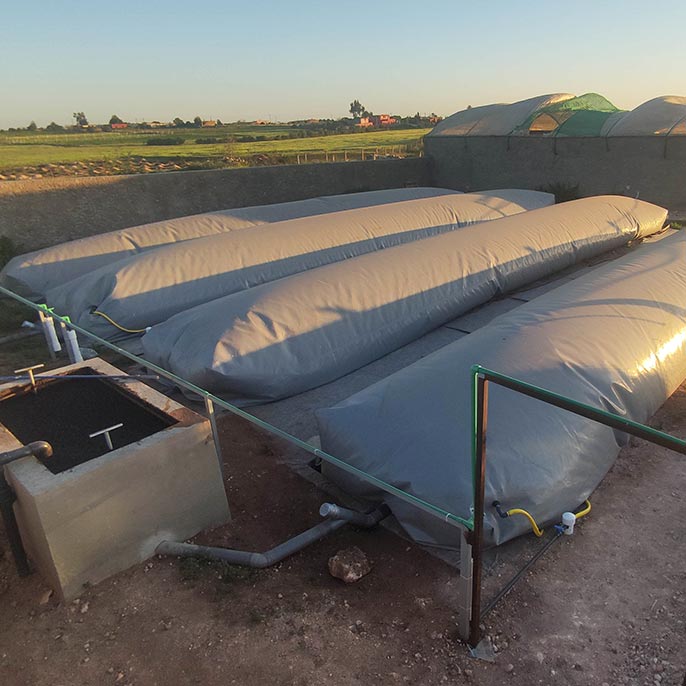
Innovative solutions for organic waste transformation
In 2017, the waste management sector in Morocco witnessed the arrival of an innovative newcomer: BIODOME SARL. Founded by visionary entrepreneur Fatima Zahra Beraich, BIODOME SARL is a pioneering company that focuses on constructing and installing advanced biogas and composting plants.
Driven by her passion for chemistry and the environment, Fatima Zahra managed to combine her scientific expertise with an entrepreneurial spirit to develop new solutions to two pressing challenges: the lack of recycling options for organic waste and the limited access to energy in Morocco’s rural areas.
“I have always been very curious about waste management but on a small scale, at the level of individuals and small companies,” Fatima Zahra recounts, explaining that BIODOME was born out of the hypotheses that she developed during her doctoral thesis.
“Seeing so much rubbish in the streets was truly bothering me! I wanted to explore waste treatment and understand why a system that worked at a larger scale -organic waste management- could not be applied to a non-productive sector in our country,” Fatima continues.
Recognising the untapped potential of her theory, she envisioned a solution that would simultaneously address waste disposal, fertiliser needs, and energy production and put her theory to the test by studying the natural decomposition process, managing to effectively transform organic waste into valuable resources.
“Don’t be fooled: there was a lot of testing!” she remembers with a laugh, stressing that “I had nowhere to start from really. No one in my family or close to me was working in science.”
But through constant Research and Development (R&D) efforts and unwavering support from EU-funded programmes like THE NEXT SOCIETY and various networks, Fatima managed to harness technology in an affordable and sustainable manner. She explains that “the degraded material provides nutrient-rich fertilisers, while on the other hand, the released biogas offers a cheap and recyclable energy source”.
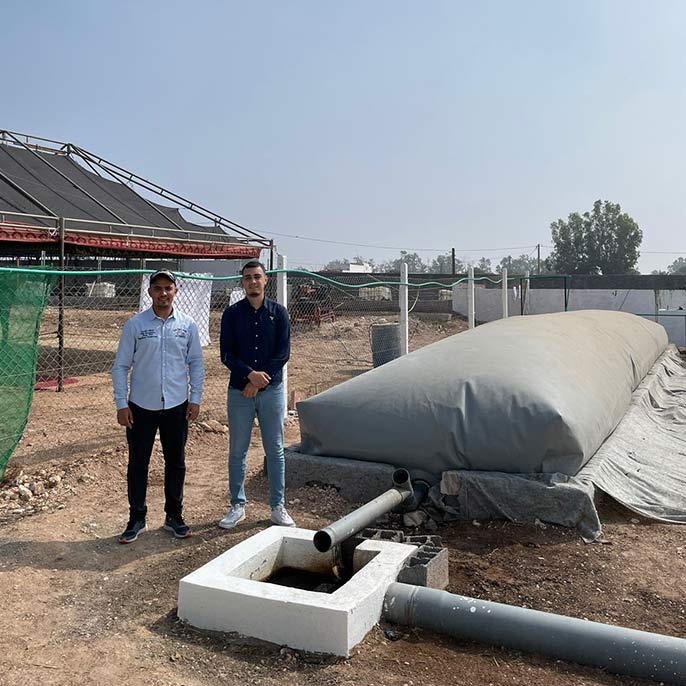
Empowering communities through BIODOME’s sustainable solutions
With local materials and traditional construction techniques, the engineers of BIODOME -local workers trained by Fatima Zahra- build concrete domes on farmers’ plots, which are then buried underneath the ground. More recently, BIODOME also developed a number of new composters, which allow the composting of food and organic waste or any organic waste without noise or odours in 4 to 6 weeks.
“Depending on the size, you can process between 300kg to two tons per week!” Fatima Zahra explains, noting that while such technology in Europe remains costly, BIODOME’s team has managed to maintain reaction and fermentation conditions at a reduced expense.
“We have come up with a new system whereby we have bags installed halfway into the ground. These ones only take a few days to compost waste and a small sized-one produces between 3 and 4 hours of energy in cooking time,” she continues.
Fatima Zahra also insists on the economic gains of this system as these digesters also produce a large quantity of digesta that farmers can then resell as fertiliser bottles.
“That way, we keep costs low and we support small farmers and communities.”
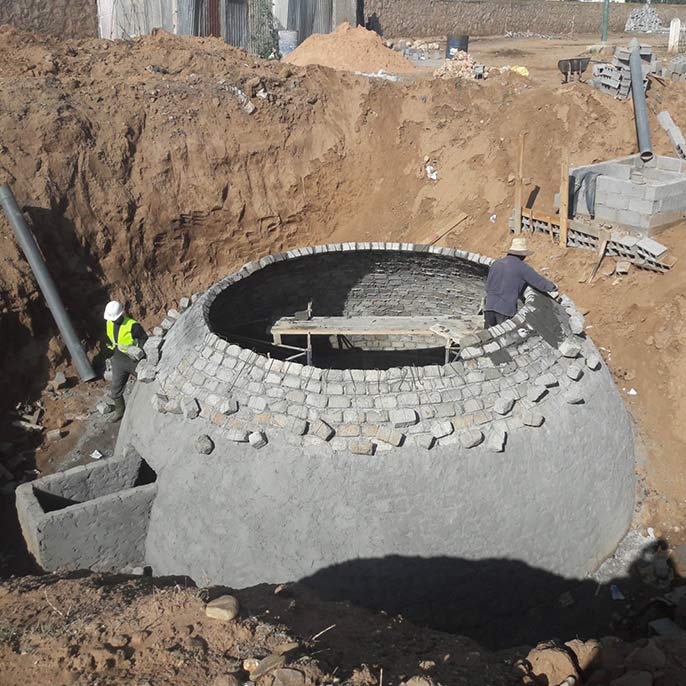
Overcoming challenges and pioneering change
Fatima Zahra’s journey as an entrepreneur has not been without its obstacles though. Starting with minimal resources, she relied on her ability to propose ideas to backers, participate in EU-funded exchanges, and seek prospective clients.
“It was difficult to convince traditional farmers to embrace but mostly to INVEST in this new technology,” she recalls, adding that most of them were unaccustomed to seeking advice from startups, “let alone led by a woman!”
But, with unwavering perseverance and an unshakable faith in her idea, she gained the trust of early adopters like Zakaria Rachid, a dairy farmer from El Jadida province.
After establishing his dairy farm in 2017, Zakaria faced numerous operational problems, in particular that of soaring costs. Struggling to recover his investments, he looked for ways to optimise his production.
“I read about many successful attempts of methanisation in Latin America and Europe but these processes were virtually unheard of in Morocco. So, when I came across BIODOME’s webpage, I decided to take the risk,” he recalls.
“The first time I turned on my gas stove thanks to energy produced by fresh manure, I was amazed!” Zakaria recalls with laughter.
In only four months, the farm owner has already witnessed a 50% decrease in his use of fertilisers, in addition to a sharp increase in productivity.
“I see a stark difference in my daily work. To be honest, the installation of those four digesters has revolutionised my farm, both on the sustainability and cost-efficiency aspects.”
Today, Zakaria advocates for BIODOME’s expansion in rural areas, notably by inviting fellow farmers to visit his farm and witness the benefits firsthand. He hopes to inspire other farmers to explore similar sustainable solutions, benefitting both the environment and their economic viability.
“They need to see the technology in action to invest confidently,” he concludes.
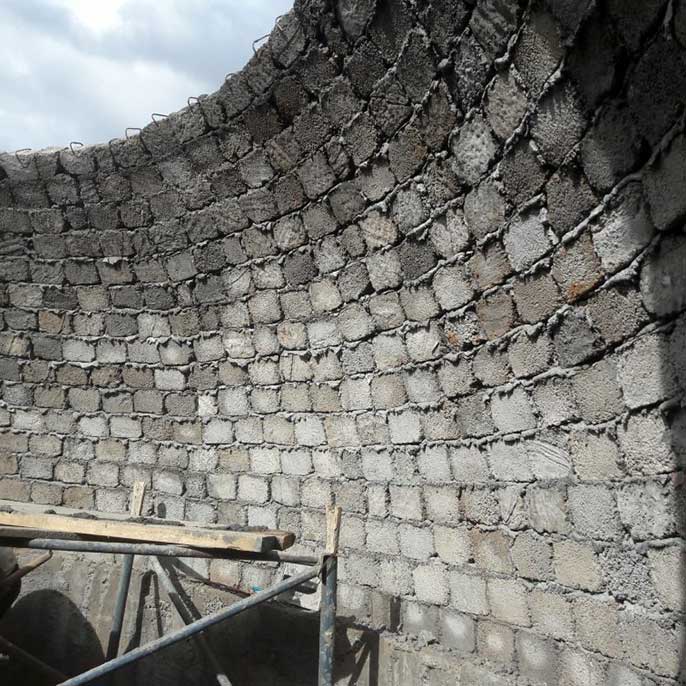
Aiming for a sustainable future: EU support towards new horizons
For Fatima Zahra, this kind of testimony is vital to continue sustaining her business. Since its creation, BIODOME has expanded to cater to small and medium agro-industrial companies, universities, and schools, while remaining dedicated to its core base of small farmers.
“With BIODOME, I chose to make a personal contribution to these local communities. I could have joined a big company but I knew that I could find people to believe in me and help me go all the way she stresses.
She fondly remembers the crucial support she has received from Hassan 1 University and EU-funded programmes. Initially supported by the Tech Booster Programme of the EU-funded The Next Society, BIODOME benefited from tailor-made support from a pool of experts, mentors and investors. This helped the young entrepreneur and her team better understand the market, and obtain more funding and business opportunities.
Later on, Fatima Zahra was invited by the Union for the Mediterranean where she connected with SwitchMed, an EU-funded programme dedicated to promoting sustainable consumption and production in the Mediterranean region. “With this partnership, BIODOME received assistance in branding and the construction of a facility for associations, which serves as both a functional unit and a community education tool,” the entrepreneur continues.
Thanks to the EU backing, BIODOME has really blossomed, with its impact now extending beyond Moroccan borders.
“We have a research programme in Ivory Coast, which explores remote-controlled digesters and adapts our solutions to local contexts”. By making the technology more adaptable and scalable, Fatima aims to unlock the full potential of her biodomes and create a sustainable future, even in areas lacking access to traditional energy grids.
“I will never stop investing in R&D because I want to make sure this technology remains accessible and affordable,” the young entrepreneur stresses, voicing her hopes to see “biodomes flourish all over Africa.”




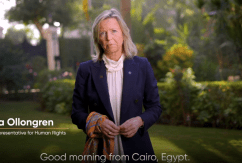








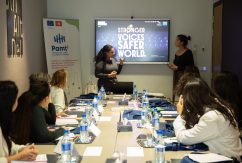
















 Syria
Syria 



